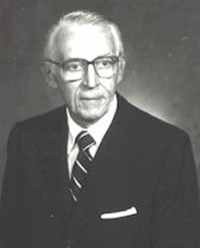Ivan Viest was a member of the original Class of 1946-47. He attended Georgia Tech and became “a man without a country” when the Communists overran Czechoslovakia. He was rescued by Messrs. Will Watt, Kendall Weisiger and the Trustees. Later, he became a naturalized US citizen. Ivan has had a distinguished career as a civil engineer with Bethlehem Steel Corporation and is currently in private practice as a consulting Structural Engineer. He and his wife, Barbara live in Bethlehem, PA. They now visit his former homeland as “ambassadors.”
Every GRSP student — 50 years-worth of international students — is a member of a unique, select group, attending Georgia’s schools of higher learning. We, the alumni — over 2,000 of us — are most grateful to Georgia Rotarians.
The Program has had a profound effect on our lives. Let me highlight just some of the influences that have been important in my life:
· it enabled me to get to know Georgia and the United States;
· it gave me countless opportunities to be an “ambassador” for my native land;
· it increased my English proficiency;
· it enriched my academic knowledge;
· it helped me launch my professional career;
· it broadened my circle of friends & acquaintances;
· it introduced me to Rotary’s high and noble goal of World Peace Through Understanding.
I came to Atlanta on April 11, 1947 as the fourth student in the program. I was preceded by a Norwegian — Paul Dietrichson; a Frenchman — Francois Cavoir; and a Greek woman from Alexandria in Egypt — Sophie Papassinessiou. I first met all three at the 1947 District Convention of the Rotary Clubs of Georgia. It was held in Savannah. Paul and Francois left Georgia shortly after the convention, but Sophie remained for another year. As a successful business woman who now lives in Athens, Greece, Sophie asked me to convey to you her warm greetings and best wishes .
Actually, Sophie was among the first to arrive. And, if my memory serves me right, Jan de Kroes — The Netherlands — was the fifth. I have stayed in touch with Sophie and Jan until this day. Even at the early stages of the program, the list of countries represented were impressive: Finland, Germany, Great Britain, Greece, The Netherlands, Czechoslovakia, Estonia, Hungary, Lebanon and Norway.
Even as late as Christmas 1947, my intention was to spend only one academic year in the United States and then return to my native Czechoslovakia. But things didn’t work out that way. In February 1948, during my studies at Georgia Tech, the Communists staged a “putsch” and took over the Czechoslovakian government. That was the end of democracy and the beginning of a vicious dictatorship, based on the Stalin model. This change resulted in my eventual decision to remain in the United States. The Communists retained their hold of power in Czechoslovakia for over 40 years. Thus, the first and most profound effect of my being a GRSP student, was fortuitous: the opportunity to live a full life in a free western society.
How did I get to know Georgia and the United States?
Well, in the first place, simply by living in Atlanta, attending Georgia Tech and rooming in the Georgia Tech residence halls. The last two were most effective, since Tech was attended by students from all over the United States, many of them veterans of World War II. My contacts with them added inestimably to my receiving a broad picture of the life and trend of thoughts in this country.
Three additional factors figured prominently in my orientation: attending Rotary Clubs and other organizations; visiting private homes; and traveling, extensively.
In 1959, Georgia Rotarians published a booklet entitled Georgia Rotary Student Program — Making a World of Friends. The publication included excerpts from 137 letters from former GRSP students, written in response to a request from Mr. Watt. He asked for some personal data and for:
“… your estimate of this program, especially as it relates to our main objective to promote international understanding, good will and peace in the world.”
The booklet makes for most interesting reading. The following edited quotation, regarding the Program’s significance by Birte Elizabeth Lund of Denmark, answered Mr. Watt’s question particularly well:
“The greatest merit of the program is the opportunity it gives so many young people to go to a foreign country, to live there, attend school and to really get to know people. What was for many centuries available only to the upper classes is now available to all youth. I think that many misconceptions are eradicated in this way.”
We who have been participants in the Georgia Rotary Student Program have found that basically people feel and think the same way, all over the world. I feel certain that this Program is the best possible way for promoting international understanding, and securing the Peace we all want for ourselves and for our children.
Ivan M. Viest
Czechoslovakia
GRSP Class of 1946-47


